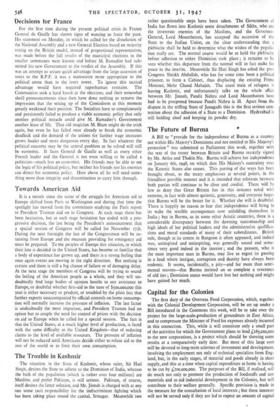The Future of Burma
A Bill to "provide for the independence of Burma as a country not within His Majesty's Dominions and not entitled to His Majesty's protection" was submitted to Parliament this week, together with the text of the treaty between Britain and Burma recently signed by Mr. Attlee and Thakin Nu. Burma will achieve her independence on January 6th, 1948, on which date His Majesty's suzerainty over the Karenic States also ceases. This parting of the ways has been brought about, as the treaty emphasises at several points, in the friendliest possible manner and it is intended that relations between both parties will continue to be close and cordial. There will be few to deny that Great Britain has in this instance acted with extreme, in fact with almost quixotic, generosity, and everyone hopes that Burma will be the better for it. Whether she will is doubtful. There is happily no reason to fear that independence will bring in its wake the terrible consequences now unfolding themselves in India ; but in Burma, as in some other Asiatic countries, there is a considerable discrepancy between the dawning statesmanship and high ideals of her political leaders and the administrative qualifica- tions and moral standards of many of their subordinates. British rule, though at its centre in Rangoon it often appeared, and indeed was, uninspired and uninspiring, was generally sound and some- times very good indeed in the interior ; and the peasant, who is the most important man in Burma, may live to regret its passing in a land where intrigue, corruption and clacoity have always been endemic. It seems, incidentally, a pity—and for more than senti- mental reasons—that Burma insisted on so complete a severance of old ties ; Dominion status would have lost her nothing and might have gained her much.


































 Previous page
Previous page